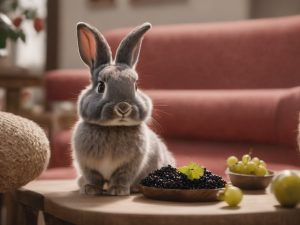Can Rabbits Eat Blackcurrants? How Much Can They Eat? Nutritional Guide for Fruits
Blackcurrants, those tantalizingly tart dark purple

Unraveling the Rabbit Diet Mystery
Before diving into specifics, let’s get a holistic view of what a rabbit’s diet looks like. Their primary
Why All the Fuss About Blackcurrants?
Blackcurrants are nature’s small, juicy bombs of health benefits. However, the primary question remains: can our bouncy buddies eat them?
Yes, rabbits can nibble on blackcurrants. But moderation is non-negotiable. Why? Because these berries, like all fruits, have natural sugars. While these sugars aren’t harmful per se, in large quantities, they can upset a rabbit’s sensitive digestive system.
If you’re contemplating introducing blackcurrants to your rabbit, start slow. Maybe one berry to begin with. Monitor for any adverse reactions. If all seems well, consider blackcurrants as an occasional treat. An average adult rabbit can safely savor two to three blackcurrants once or twice a week.
Peeling Back the Layers: Blackcurrant Nutrition
Vitamin C Booster
Blackcurrants carry an impressive amount of vitamin C. While rabbits naturally produce vitamin C, a wee-bit from external sources can offer added benefits.
Fiber Source
Blackcurrants have a fair amount of fiber, aiding digestion and ensuring everything moves smoothly in a rabbit’s system.
Antioxidant Reserve
Beyond vitamin C, these berries are a repository of other antioxidants, shielding the body against harmful free radicals, ensuring cellular health.
Mineral Rich
Potassium, magnesium, and calcium make notable appearances in blackcurrants. These minerals support various bodily functions, from muscle movement to bone health.
Blackcurrants Nutrition for Pet Rabbits
References:
- https://barksandbunnies.co.uk/products/blackcurrant
- https://rabbitwelfare.co.uk/recommended-vegetables-and-herbs/
- http://forums.rabbitrehome.org.uk/archive/index.php/t-183377.html
- https://rabbunny.com/can-rabbits-eat-blackcurrants/
Treading with Caution
While blackcurrants have their benefits, certain precautions are mandatory:
- Sugar Watch: Natural sugars, though better than processed ones, can still be tricky for rabbits. Overconsumption can lead to obesity or digestive concerns.
- Pesticide Alert: Store-bought blackcurrants might have pesticide remnants. Always wash fruits thoroughly before feeding. Or better, go organic.
- Individual Differences: Every rabbit is unique. Some might relish blackcurrants, while others might have a mild reaction. Always observe and adjust.
Exploring Other Fruitful Options
While blackcurrants can be a refreshing change, it’s good to have a fruit arsenal ready for your bunny. Here are a few:
- Blueberries: Loaded with nutrients,
are a safe bet. But, as with blackcurrants, moderation is the name of the game. - Strawberries: These red delights are rabbit-friendly but remember to clean them well and discard the green tops.
- Raspberries: Another nutrient-rich berry. Just ensure you don’t go overboard with quantity.
- Apples: A rabbit’s favorite but without the seeds, please.
- Pears: A sweet juicy treat, sans the seeds.
The Balanced Diet Key
Blackcurrants, though brimming with health benefits, are just one piece of the dietary puzzle. The perfect diet for your rabbit is balanced, with hay as its cornerstone, supplemented with fresh greens and the occasional fruit treat.
The heart of the matter is simple. As caretakers, our ultimate goal is to ensure our rabbits live a life that’s not just long, but also filled with health, vigor, and of course, a bit of fruity indulgence. By understanding their dietary needs and offering variety in moderation, we create a roadmap for their well-being. Remember, a happy bunny is a healthy bunny!







Leave a Reply